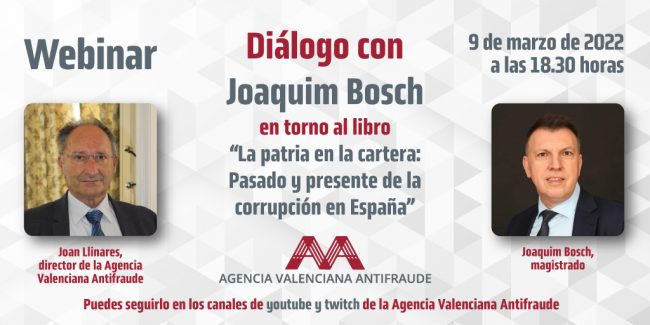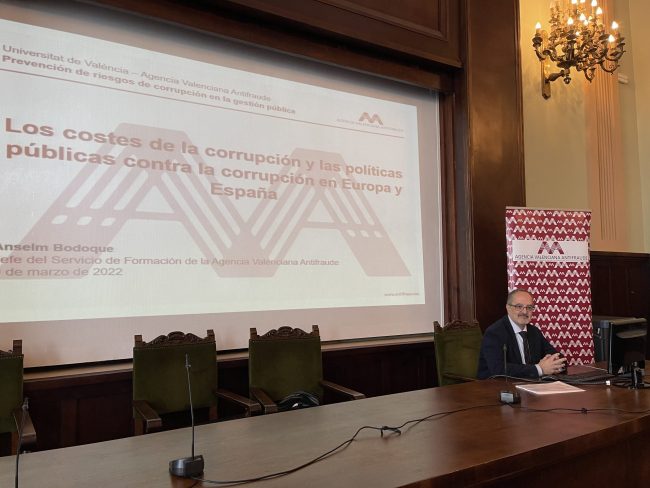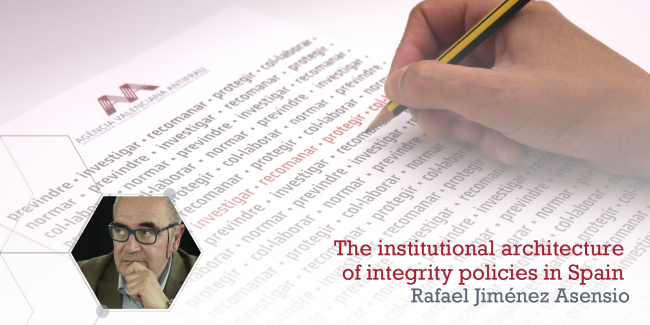Objective: Improve institutional quality. The AVAF course for the PAS staff of the University of Valencia on risk prevention in public management concludes.
#TrainingAVAF
The last session of the course “Prevention of corruption in public management”, prepared by the Valencian Anti-Fraud Agency, in collaboration with the University of Valencia, was given by Anselm Bodoque, head of the AVAF Training Service.
“The cost of corruption and public policies against corruption in Europe and Spain”, the title of the presentation, made it possible to share reflections on the various aspects of the negative effects of fraud and the general interest.
Excessive public spending, the reduction of public investment in essential services, the exclusion of innovative and honest companies or permissiveness in the face of tax fraud were some of the negative effects that were exposed in the session on corruption in public management on the 9 March 2022.
During the conference, it was stressed that fraud also implies economic and reputational costs for society, for public management, the legitimacy of institutions and collective well-being.
The second part of the conference focused on the study of the configuration process of public policies against corruption in Europe, Spain, and the Valencian Community.
The temporal origin can be placed around 1990, in the context of the III Industrial and Technological Revolution, the fall of the Berlin Wall and globalization. The OECD, the EU, the Council of Europe and the UN are the first international organizations that promote conventions, agreements or organizations to combat corruption.
The beginning of public policies on corruption at the international and European levels put the accent on the fight against organized crime, political corruption, and the legal and police persecution of the corrupt. In the session, it was insisted on the fact that Spain does not have a general strategy to prevent and fight against corruption, such as the one that has been developed in the Valencian Community since 2015, which has incorporated initiatives aimed at improving institutional quality.
The session highlighted that it is precisely on improving the general institutional quality that initiatives should be concentrated to reduce our level of corruption and place it at the levels of the most advanced countries in Europe. In fact, countries with lower rates of corruption base their position on having a strong, democratic and socially legitimate institutional system and allocate fewer resources to the legal, regulatory and police prosecution of corruption.
Throughout five weeks, the managers of the PAS staff of the University of Valencia have actively participated in the sessions where the existence of the institutional system of integrity in our country, the necessary integrity plans in public organizations, the phases of the anti-fraud cycle of Order 1030/2021 of September 29, as well as the costs of corruption in the public sphere.
Along with the lectures given, the attendees were the protagonists of a practical session where they had the opportunity to reflect on the protection of corruption whistleblowers, the necessary implementation of internal and external reporting channels, the importance of informal alerts, and the strategic vision of planning as a tool to combat irregularities and risks known to public administrations.
The AVAF appreciates the predisposition of collaboration and support of the Permanent Training and Educational Innovation Service (SFPIE) and its interest in the work of the Agency in matters of public integrity.






